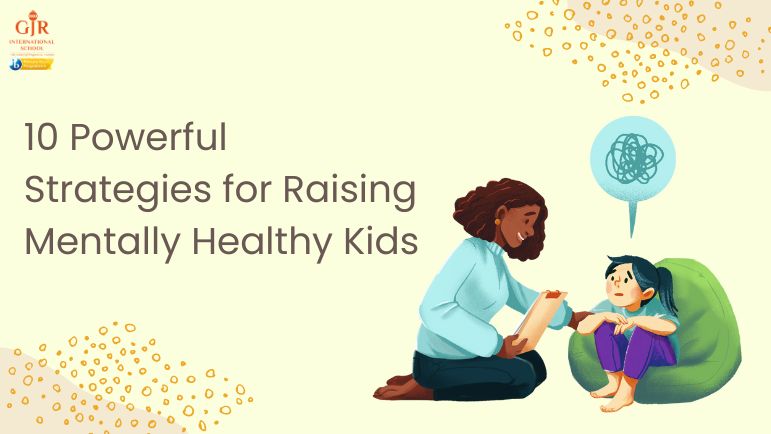
The world can be a tough place for kids. Between academic pressures, social anxieties, and the ever-present influence of technology, there's a lot on their plates. As parents, it's our responsibility to equip them with the tools they need to navigate these challenges and thrive.
One of the most crucial tools we can offer is support for their mental health. Just like physical health, mental wellbeing is vital for a child's overall well-being. It impacts everything from their emotional development to their academic performance and social interactions.
But how do we nurture and support our children's mental health? Here are 10 powerful strategies to get you started:
Communication is the cornerstone of any healthy relationship, and it's especially important when it comes to our children's mental health. Create a safe space where your child feels comfortable expressing themselves openly and honestly.
This means making time for regular, one-on-one conversations, not just interrogations during car rides. It means setting aside distractions, making eye contact, and truly listening to their words and emotions. Let them know you're a safe haven, a non-judgmental space where they can share their worries, frustrations, and even their silly thoughts.
Listening goes beyond simply hearing words. It's about paying attention to both the verbal and nonverbal cues. When your child opens up to you, actively listen. Put away your phone, maintain eye contact, and acknowledge their feelings. Ask clarifying questions, but avoid interrupting or offering unsolicited advice.
The goal is to create an environment where they feel understood and supported, not judged or pressured to solve problems on their own. Sometimes, all they need is a listening ear and the comfort of knowing you're there for them.
Children thrive on predictability. Creating a consistent routine provides a sense of security and comfort. This includes setting regular bedtimes, mealtimes, and playtime schedules. It also involves establishing clear expectations about behavior and consequences.
A structured environment helps children feel in control and reduces anxiety. Knowing what to expect allows them to focus on tasks and activities without the added stress of uncertainty.
A healthy body leads to a healthy mind. Encourage good sleep habits by establishing consistent bedtimes and creating a relaxing bedtime routine. Ensure your child gets enough sleep – the amount varies by age, but generally, younger children need more.
Nutrition also plays a crucial role. Prioritize a balanced diet rich in fruits, vegetables, whole grains, and lean protein. Limit sugary drinks and processed foods, which can negatively impact mood and energy levels.
Don't forget the importance of physical activity. Encourage your child to engage in regular exercise – sports, outdoor play, or even dancing in the living room! Physical activity is a great way to combat stress, improve focus, and boost overall well-being.
Positive reinforcement goes a long way. Don't reserve praise only for perfect grades or winning performances. Acknowledge and celebrate their efforts, their perseverance, their willingness to try new things.
This reinforces the idea that success is a journey, not just a destination. When children feel recognized for their hard work, they're more likely to persist through challenges and develop a healthy sense of self-esteem.
Humans are social creatures, and strong social connections are essential for mental well-being. Help your child build positive friendships with other children. Encourage playdates, join a local club or team activity, or volunteer together to create opportunities for them to interact and build relationships.
Being part of a supportive network of friends can provide a sense of belonging, reduce loneliness, and offer valuable social support.
Children experience a full range of emotions, just like adults. Don't dismiss or minimize their feelings. Instead, acknowledge and validate them. Let them know it's okay to feel sad, angry, frustrated, or scared.
By validating their emotions, you build trust and create a safe space for them to express themselves freely. Help them learn to identify and name their feelings. You can use tools like emotion charts or picture books to aid in this process.
Life throws curveballs, and it's important for children to have tools to manage stress and difficult emotions. Teach them relaxation techniques like deep breathing exercises, mindfulness meditation, or progressive muscle relaxation.
Encourage healthy outlets for expression – drawing, journaling, playing music, or engaging in physical activity can all be helpful coping mechanisms.
In our busy lives, it's easy to let quality time with our children fall by the wayside. However, carving out dedicated moments for connection is crucial. Put away distractions like phones and laptops, and simply be present with your child.
This could involve anything from playing games or reading together to going for a walk or cooking a meal as a team. These shared experiences create lasting memories and strengthen your bond. Feeling connected to their parents provides children with a sense of security and fosters positive mental well-being.
Just as we wouldn't hesitate to seek medical help for a physical ailment, don't be afraid to seek professional support for your child's mental health. There's no shame in asking for help.
If you're concerned about your child's behavior, mood, or emotional state, reach out to a therapist or counselor who specializes in children's mental health. Early intervention can make a significant difference, and a therapist can provide valuable guidance and support for both you and your child.
Remember, raising mentally healthy children is a journey, not a destination. There will be ups and downs along the way. By prioritizing open communication, establishing healthy routines, and equipping them with coping mechanisms, we can create a foundation for their mental well-being and empower them to navigate life's challenges with resilience and strength.